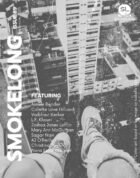Los Angeles is pelted by torrential rains the same week my father is admitted to the hospital with too much fluid in his legs. You cannot safely empty them slowly, explains the doctor, as they hook him up to an IV to which they add, twice daily, a diuretic to drain the liquid so it will not rise up and reach his lungs and drown him. At the same time, when I’m home from the hospital, the house intermittently releases a blast of water from an outdoor pipe hooked up to a sump pump in the tiny basement that has a few inches of rain gathered from this highly unusual wet winter, storm upon storm, flooding in California towns, basement water rolling down the driveway as it exits. “I like the sound,” says my daughter, whose bed head is right near the pipe. “Whoosh and then a little gurgle.” It happens ten times a day. My father pees and pees in the hospital, an aide helping him to the bathroom, the doctors watching his kidney numbers because his kidneys are also worn. He loses thirty pounds of fluid weight in his two and a half weeks there until the doctor crows that he can see his tibia again, tapping on his shin, “look, there it is!” His mind is clearer when the fluid is down because his sodium is up and all these things impact thinking. He asks again how I am. He tells me about his past.
The first night in the hospital, when I took the family shift to stay over as he settled in, I sang “Both Sides Now” in the room because we were alone and it’s soundproofed in there or something and for once my voice didn’t wobble from the emotional load. I just wanted to sing it to him. I know all the words from childhood when he would play his Judy Collins record, her long honey-blond hair on the cover, wearing some kind of tilted wide-brimmed hat, me listening carefully to the lyrics sitting cross-legged near the record player before I knew who really wrote it. Rain poured down outside the hospital, visible streaks through the window. He was half-aware of what was going on, and over a week later, clearer, asked me, “do you know that song ‘Both Sides Now’? It’s been in my head all week.” I printed out the lyrics and told him Joni had apparently been in a rough patch when she wrote it, first on a plane, looking out at the clouds, having recently given up her daughter for adoption, going through a divorce. He shook his head, eyes wet as he read the words. “What kind of brilliant mind can make this up?” he said. The food tray comes in. Low sodium fish and potatoes. He’s a few days till discharge at this point, and one nurse jokingly asks him to stay because he is sweet, because he thanks her, and uses her name. “You think I’ll get out of here?” he asks us both, eyes big. I tell him I read an interview with Joni where she said usually she was pretty guarded but when she recorded Blue in the studio she felt like a bag of organs in a transparent sac on view for all to see. He is sitting in his chair with pillows behind him and blankets in his lap and fierce gray eyebrows as the blood pressure cuff tightens on his arm. “Oh,” he says, “I believe it.”
Was it cruel that I’d lodged “I really don’t know life at all” in his head all week? Was it helpful? He doesn’t want to talk about death.
The plumber visits at home due to a faulty toilet and after he fixes it, we ask him to check the tiny basement and sump pump just in case. He says it’s just doing its job, pumping out the water, and will do so for a while. It was a record-breaking rainy season, and the water table has risen. By this point, it’s largely the groundwater, he explains, gesturing widely in his boots—even on the dry days, the pump will continue to discharge water onto the driveway, maybe for months, maybe for longer. Already bright green creek-like algae grow in the cracks of the cement.
When he leaves, I look up ‘groundwater’ and check out diagrams of water tables. Water beneath the surface, I read. Inside the pores and crevices of rock. I have been feeling the tears doing the same, at times exiting, mostly building up in my internal storage unit of grief, and sometimes it seems that while the world does its business the metaphors are just waiting alongside, ready to be plucked; surely it had to be so with Joni Mitchell staring out her portal window on the flight, and seeing something different in those clouds.
I drive back to the hospital through the rain. Park in the same outdoor parking lot named for Steven Spielberg and duck through the pelting water to navigate the winding corridors. Pass by abstract paintings and the variety of beeping machines. The song’s back in my head; my father hasn’t said anymore about it but it’s looping in my mind all the time now. I also picked it for myself, it seems.
What did she mean about life’s illusions? So many there are. Even here, right at the edge of death, I look hopefully to the nurse.
“He slept better,” she assures me, as I settle into my spot by his bedside to wait.


